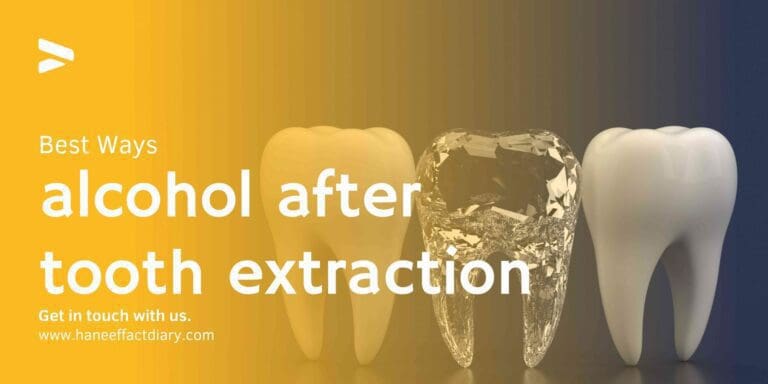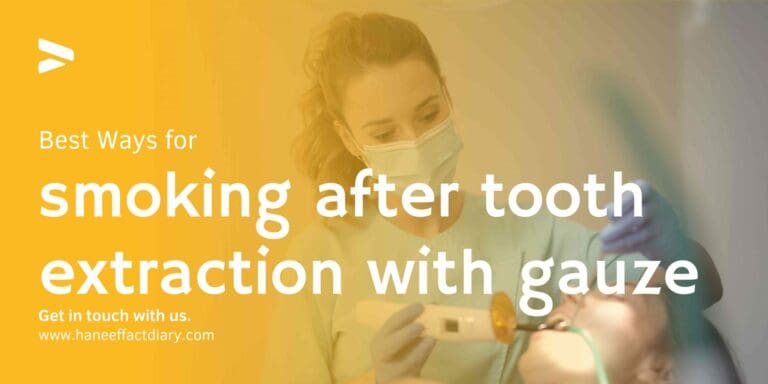Does gauze prevent dry socket? how to treat dry socket?

Though it is true that only two to five percent of patients experience dry sockets after wisdom teeth extraction It is painful and can take a long time the healing process.
It’s only natural to prefer to avoid it. Understanding how to prevent dry sockets can alleviate your worries and aid the healing process to allow you to return to your normal routine in as short a time as is feasible.
Learn more about the definition of a dry socket and ways to prevent dry sockets after having wisdom teeth extracted.
What Is Dry Socket
What is a dry socket? Sockets are a slit in your bone , where the wisdom tooth was extracted. The blood clots usually form and heals within the socket. Dry socket, also known as alveolar osteitis occurs when that blood clot becomes broken and exposes your neural socket as well as nerves food, air and bacterial.
Dry socket leads to slow healing after surgery, and it is more likely to happen when wisdom teeth are extracted lower as opposed to upper wisdom teeth.
Dry socket symptoms include bad breath, unpleasant taste in your mouth, a dry area in which the blood clot is supposed to be, and perhaps most importantly extreme pain. The pain is described as radiating or throbbing and can extend beyond the socket to the ear.
The signs usually appear around two days following the operation.
What Causes Dry Socket
A dry socket could be caused by any cause that removes the blood clot out of the socket, before it is able to heal. Most commonly, the cause is sucking straws from food items or straws that gets stuck in the socket. Other causes of dislodging or disruption can include spit or coughing and the sneezing.
Certain studies have shown the fact that pills for birth control increase the chance of suffering from dry socket. If you use Birth control tablets, it is recommended to inform your dentist ahead of time.
How to Prevent Dry Socket
If you’re planning to undergo wisdom teeth healing and you’re likely to know how to prevent having dry sockets. These are the best suggestions to prevent dry sockets but be sure to adhere to the dentist’s instructions for surgery.
Eat the Right Food
Dry socket prevention begins by eating the right foods to encourage the proper healing. After extractions of teeth the best food to eat is one that is easy to chew and doesn’t require any chewing. Some great options to make a list of in advance are soup, potatoes mashed, apple sauce, ice cream, the yogurt of mashed beans and smoothies.
It is recommended to stay clear of crunchy or hard food items which require chewing frequently at the very least for the first few days following the surgery. They can swell the blood clot and become trapped in it and could cause irritation to consume them all.
Avoid Straws and Smoking
To avoid dry socket Also, stay clear of any suction method which could pull the blood clot away from the. One of the main suction sources to avoid are straws. The air that comes from the straw as well as the motion your mouth makes while drinking from it could cause dry socket.
It is recommended to avoid drinking through straws for at most one week following surgery.
Smoking cigarettes is another major reason for dry socket. In reality, smokers are 12 percent more likely to develop dry sockets – which is more than twice the risk of non-smokers. This is true for any kind of drug, not only cigarettes.
Smoking tobacco, however, can interfere with this process of healing. It is possible to stop smoking cigarettes in the days after your wisdom teeth extraction , if you reduce the amount you smoke in the weeks preceding. You may also try nicotine patches, but not gum with nicotine.
Keep the Area Clean
The importance of maintaining your dental hygiene is never less However, it’s more important following tooth removal. By brushing your teeth and maintaining a clean area can prevent bacteria from getting in the wound, damaging the clot, or even causing an infection.
The ortho dentist will give you instructions on how to clean your teeth. It’s likely that you’ll be instructed to refrain from brushing on day oneand to brush frequently, but gently in over the next few days.
It is also possible to do regular saltwater rinses, and you may be advised to use one of these mouthwashes to prevent bacterial infections.
Rinse With a Syringe
The ortho doctor may give you a curving needle for washing the site of the wound. It is recommended to wait five days prior to using the syringe , so that the blood clot stays firm in its the proper location. After that, wash gently to prevent removing it.
The area to be extracted should be cleaned using the syringe can help get rid of food particles.
Don’t Get Teeth Extracted While Sick
A crucial factor to avoid dry sockets is that you not plan an extraction of wisdom teeth while you’re sick. Always wait until you’re feeling better. The reason is that sneezing and coughing can be violent mouth movements that could cause the dislodgement of the blood clot that heals. It is also beneficial to heal the body’s health to remain in top shape.
If you suffer from severe allergies Be sure to talk to your dentist for the precautions you need to follow.
Get Plenty of Rest
A lot of rest is essential in the healing process following an extraction of wisdom teeth. The body is at rest when it heals and the more rest you get, the more you will benefit. Also, you’ll move your mouth at a minimum during your sleep, which is an ideal time for healing to take place.
If you are able avoid talking excessively for during the initial 24 hours following the procedure. Keep gauze around the wound’s site inside your mouth until bleeding ceases. Both of these steps will to allow the blood clot to develop and form before it settles.
It is recommended to avoid any exercise in the following days after surgery , as increasing your heart rate could result in bleeding that is not needed and cause complications.
Now You Know How to Avoid Dry Sockets
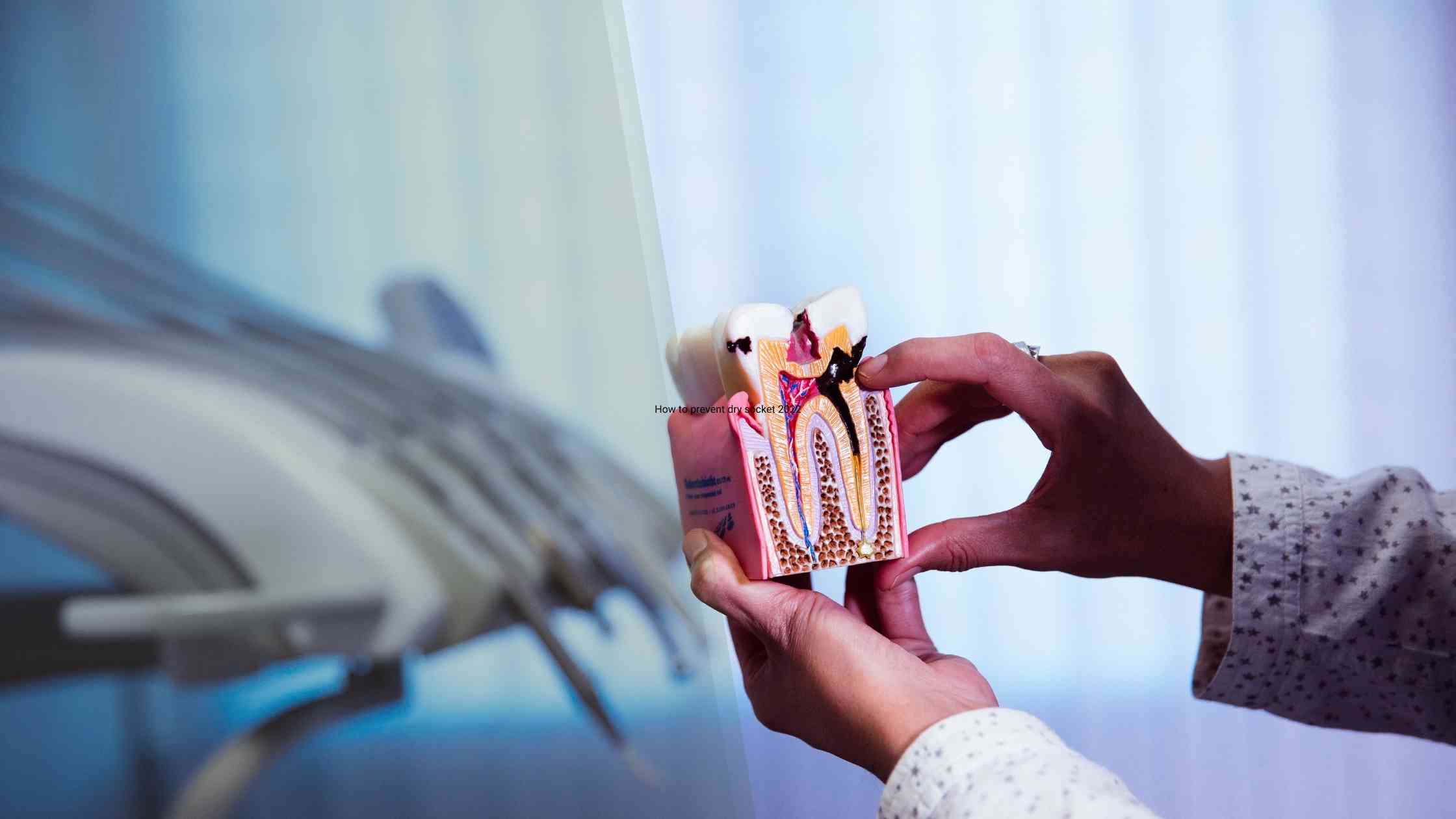
You now know how to prevent dry sockets. Knowing is the first step to prevent it.
As long as you adhere to the guidelines in this article and follow the advice in this article, healing following wisdom tooth extraction will be significantly less difficult. If you’re suffering from bleeding or pain for within a few days of the procedure or if your pain becomes worse suddenly you should contact your surgeon or dentist right away to arrange a follow-up.
Following a tooth extraction there is a risk that a blood clot forms on the tooth socket. The blood clot is a shield for the nerve endings within the bones and forms an essential part of healing.
In other instances the blood clot does not form or is dislodged. This causes the nerves and bones within the socket are exposed. Dry sockets are prone to delayed healing and is very painful.
According to an 2017 article by the Trusted Source dry sockets are found in approximately 1-5 percent of all extractions, and 38 percent from wisdom tooth extractions.
Also Read:
Best Ways to Know how many teeth do humans have 2022
Best Ways alcohol after tooth extraction 2022
Best Solutions For Smoking after tooth extraction 2022
Prevention
It is recommended to avoid doing anything that may disrupt the blood clot that has formed after tooth extraction.
As per the American Dental Association (ADA), a person should be wary of the following:
- Suction creation: Smoking and drinking through straws can cause suction. These actions can loosen the clot, which can delay the healing process.
- Smoking smoking can delay healing. It also raises the pressure of blood which could cause more bleeding.
- A vigorous mouth rinse: People should take caution not to wash their mouths excessively. Rinsing your mouth is a possibility following a tooth extraction however, it is crucial to use a gentle approach in order to prevent causing damage to the blood clot.
- Alcohol It is recommended to be careful not to drink alcohol or use mouthwash that contains alcohol at least for 24 hours in order to lower the risk of the clot dislodging. Alcohol can trigger bleeding and may delay the healing process.
- Physical activities: People should limit activities that are strenuous for in the initial 24 hours following the procedure to lessen bleeding and aid in helping the blood clot to form.
It is equally important for patients to inform the dentist know of any medication they currently take, since study has found a connection with some birth control medications and the development with dry sockets.
Tooth extraction aftercare
It is essential to adhere to instructions from the dental professional’s post-treatment instructions on how to care for the site of extraction, since this will result in an improved outcome.
If anyone has concerns that the instructions do not address it is best to ask the dentist. The exact instructions can differ between dentists, but they should contain the following:
- Don’t spit or use straws for at least 24 hours after a tooth extraction.
- Be careful not to chew the lip in the area where the extraction was performed to decrease the chance of dislodging the blood-clot.
- Don’t smoke for at minimum 24 hours, and ideally 48 hoursafter extraction.
- Select soft food items over crunchy or hard foods in order to minimize the chance damage to the socket or getting food stuck there.
- Do not drink hot or carbonated beverages because both can cause the displacement from the blood clot away from the socket.
How do you clean the mouth?
In accordance with the ADA According to the ADA, one should not clean the teeth surrounding the extraction site during the duration of the day. But, they must brush and floss their other teeth.
On the day following the extraction, one can begin cleaning the teeth near the area of extraction. It is also recommended to gently wash their mouths with salty water following eating. It is possible to create saltwater by mixing half 1 teaspoon of salt in 8 eight ounces of water that is warm.
The ADA advise talking to your dentist about saltwater rinses in the event that a person suffers from excessive blood pressure. Patients suffering from hypertension might need to use warmer water in lieu of.
Symptoms
Someone who has had the tooth extracted will experience discomfort, like discomfort and swelling. If the pain gets worse or better, but is then recurred after a few days it could be due to a dry socket.
Other possible signs could include:
- blood clots missing from the socket
- An aching or throbbing pain within the gums of a patient’s jaw. It may be severe and resemble the pain of a severe toothache
- unpleasant odour emanating of a dead socket
- A bad taste is emitted from the socket
- Pain that radiates out across the entire person’s face
Furthermore, there could be exposed bone near the location of the removal.
Treatment
Treatment options could include:
- In the extraction area, you can irrigate it to eliminate food and debris
- Applying a medicated dressing on the socket, to help protect the socket until healing
- The extraction site is surrounded by zinc oxide and eugenol powder to help decrease the Trusted Source discomfort.
- using other medications to ease pain, including nonsteroidal anti-inflammatory medicines ( NSAIDs) including ibuprofen
When is the best time to visit the dentist
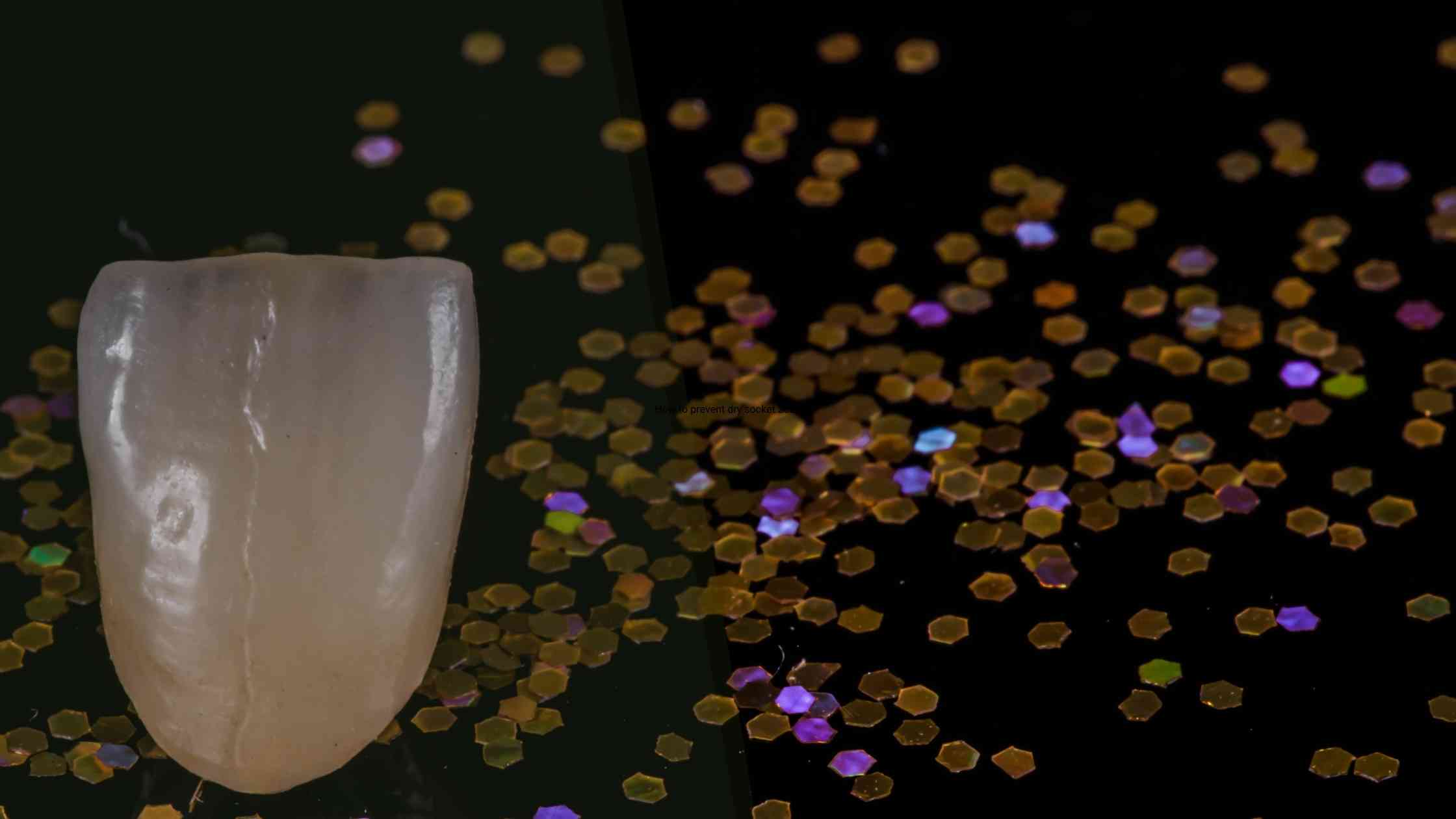
One should schedule an appointment with your dentist if they believe they have an inflamed socket. The treatment will ease discomfort and accelerate healing.
The dentist may verify that the pain isn’t caused by an infection, but rather of a dry socket. A bacterial infection could lead to more serious problems and can spread to the bone, leading to severe swelling. If this happens the patient will need oral or intravenous antibiotics to fight the infection.
The patient should visit an experienced dentist if they suffer from:
- fever
- nausea
- vomiting
- pus from the extraction site
- chronic intense discomfort
- persistent bleeding
- The swelling continues
Summary
Dry socket is a painful condition that could develop following the extraction of a tooth.
One should adhere to their dental aftercare instructions in order to reduce the possibility of developing a dry socket.
The dentist will likely suggest that the patient avoid smoking, drinking straws, eating hard food and rinse the mouth excessively.
If the pain at the site of extraction gets worse or persists for a long time, the patient is advised to see a dentist treatment.
Dry socket can occur in a frequency of around 2-5 percent following the removal of your tooth. It’s an uncomfortable condition that can interfere with the proper healing process after tooth extraction. It is caused by a blood clot that forms inside your socket becomes damaged or dislodged.
But, with the proper treatment following the tooth extraction at Long Beach at Dodds Dental You can absolutely eliminate the possibility of a dry socket. Find out more here, where we’ll provide you with helpful tips to avoid this common problem.
1. Do Not Use A Straw For 24-48 Hours After Your Surgery
The act of sucking on a straw causes lots of suction which could force the blood clot from the socket and release it, leading to dry socket. We suggest avoiding drinking from the use of a straw for 48 hours or more following procedure.
2. Avoid Spitting Vigorously After Rinsing For 24-48 Hours After Extraction
Similar to drinking from straws, vigorously spitting after washing your mouth or in any other way creates lots of suction and pressure in your mouth. This can cause a blood clot dislodging. After washing, do not to spit with force. Allow the liquid to drip from your mouth instead.
3. Don’t Smoke Or Use Oral Tobacco For 48 Hours
Smoking, or using any form of oral tobacco must be abstained from. Smoking and using tobacco could affect the flow of blood and heal surrounding the area of extraction which may lead in dry socket.
In addition, this is the ideal moment to think about quitting smoking cigarettes! Smoking cigarettes is detrimental to your oral health as well as general health, so talk about your options to stop smoking with your physician. A tooth extraction could be the final incentive you require to quit completely.
4. Do Not Brush The Extraction Site Directly For 3-4 Days
Use a mouthwash prescribed by your dentist or a warm saline wash to clean your mouth, instead of cleaning your extraction site with a brush directly. You may continue to brush your other teeth however, you must be careful around the area of extraction since brushing there could disrupt the blood clot. After 4 or 5 days, it’s safe to begin brushing near the extraction site the extraction site.
5. Eat Soft Foods And Avoid Crunchy, Hard, And Tough Foods
It is recommended to follow the diet instructions given to you by Dr. Emily or Dr. Dustin Dodds. Consume smoothies, yogurt applesauce, pudding as well as other soft foods following the surgery. After around a week, you are able to add more nutritious foods that you can eat.
Avoid hard, crunchy, and hard foods for at least two weeks. These types of foods could dislodge the blood clot and damage itor even leave residue in its wake that can cause irritation to the socket of your teeth. So, no chips or popcorn, almonds and other similar foods.
Let’s look over the inventory. Dry-cleaned, crisp shirt. Good. A high-efficiency washer and dryer. Great. A dry January. Best of luck. But what happens if you have dry sockets? Does that make sense? Mmm, not-so-much.
Dry sockets are the result after an tooth extraction is not as planned. However, if you adhere to the advice of your dentist and follow the guidelines given below, there’s no reason why you shouldn’t be able to stop the possibility of a the possibility of a dry socket from happening to you.
What Causes a Dry Socket?
Before we discuss how to prevent dry sockets we’ll look at how to obtain one. It starts with the process of tooth extraction, also known as exodontia which is a method to have some of your teeth extracted. You may need a tooth extraction due to:
- Dental decay or damage
- Teeth that are impacted or in the mouth
- Risk of infection or infection
There are some complications that can arise after the extraction of a tooth. Dry sockets are the most frequent complication, but can be avoided.
What Is a Dry Socket?
A blood clot, of the one that is right for you, forms to shield the nerves and bone at the tooth extraction location. Sometimes, however the clot could get tangled and may not fully heal. The result is dry socket. It allows bone and nerves to be without protection from bacteria, causing severe discomfort and pain. Dry sockets also slow the healing process So it’s recommended to visit your dentist immediately.
How to Prevent Dry Socket
We know the cause. We know the cause. The next step is prevention. What you can do to keep from dry sockets is actually easy. It should be a common practice for those who practice good dental hygiene. Keep the area where you extracted your tooth clean and healthy following the procedure of having your tooth extracted. This can be done by following these steps:
- Drinks and food
- Do not eat anything that is that is hard, sticky or chewy for the next few days following the procedure. Avoid eating with straws, drinking near the extraction, as well as sugary caffeinated, alcohol-based drinks. Soft foods and lots of water are your best friends.
- Tobacco use
- The advice is fairly simple. Do not smoke tobacco. Smoking exposes bacteria to the area, smoking tobacco can harm the clot. Both slow healing.
- Hygiene
- Have a rest day before attending to the site of extraction. It is still possible to clean your tongue and your other teeth. Within 24 hours you may rinse your mouth with a mouthwash that is antibacterial to wash the site of extraction.
- Rest
- Give yourself time to recover and unwind. Do not engage in activities that are physical or can impact the mouth or your health in some way. A couple of weeks of “you” lying at home watching your favorite shows will not hurt your healing.
Treating a Dry Socket
If you must suffer from a dry socket visit your dentist as soon as possible. They will tend to the area and reduce the discomfort. The dentist can take care of the socket that is dry using:
- Paste
- A dressing that is medicated ( dry socket paste) can reduce with the pain.
- Pain Reliever
- An anti-inflammatory nonsteroidal drug like aspirin or ibuprofen
Do not worry about tooth extraction. This is out of your control. Concentrate on what you’ll do following. Follow the advice of your dentist, be cautious, and properly take care of the site of your tooth extraction. If you take care of all this, you’ll surely avoid the dry socket.
Dry socket is a possibility after the tooth extracted. When you’ve had your tooth extracted and a blood clot develops at the location of the extraction to aid in healing and protecting the bone and nerves. Dry socket happens because the blood clot does not grow or becomes removed.
Without a shield food, bacteria and other contaminants could enter your socket, causing an infection.
Dry socket is very painful and makes recovery difficult. We at Wedgewood Dental came up with these suggestions to help you avoid dry socket.
Risk factors
Dry socket is a rare condition that affects approximately about two-five percentage in patients you stand greater risk of developing it if you:
- Smoke cigarettes or consume tobacco products
- Are you suffering from a tooth condition that is preexisting or gum infection
- Do not follow the recovery guidelines
- Do you have poor oral hygiene?
- Use birth control pills
- Are you suffering from dry socket
Surgery that is traumatic, such as the removal of wisdom teeth that have been damaged, also increase the chance of developing dry socket. It’s the reason it’s essential to select an experienced dental surgeon like Dr. Linda Westmoreland, carry out your procedure to reduce your chance that you’ll develop dry socket.
Preventing dry sockets
There are actions you can take prior to or after surgery to ensure that your healing is proper and to avoid dry socket.
Do not smoke or use tobacco.
Smokers avoid smoking for the first few days following your surgery. Inhaling while smoking cigarettes could dislodge the blood clot caused by the rapid, sudden release of air.
Do not use other products from tobacco. The chemicals in tobacco may reduce the flow of blood into your mouth. It delays healing and may result in an infection.
Don’t drink from a straw
Avoid drinking through straws for at least one week following the extraction. The sucking action may take out the blood clot.
Rest
After the tooth extraction, don’t anticipate to do anything apart from rest. It is crucial to make sure your socket gets the time it needs to heal properly.
Avoid any strenuous exercise for as long as you like. Dr. Westmoreland recommends. The force and the rapid breathing during sports and exercising can damage your mouth and loosen the plug of blood from your socket.
Make sure to drink plenty of water.
Drink plenty of water, and stay away from drinks that are acidic or hot. Drinks that are hot, such as coffee or tea, can cause blood clots to dissolve and cause pain as the nerves’ endings get exposed. Acidic drinks like soda may also break down the blood clot.
Take soft food items
As you recover from the tooth extraction, you should stick to a eating only soft foods like yogurt, applesauce, as well as scrambled eggs.
Avoid eating almonds, seeds or anything else that could become stuck inside your socket. If food items get trapped within your extraction site bacteria may develop and cause infection.
Make sure you clean your mouth
It’s essential to wash the mouth as well as maintain a healthy oral hygiene following your procedure. By doing this, you keep your socket and mouth free of any bacteria.
If you are cleansing your mouth, wash it gently with water, and avoid the vigorous swishing that could remove the clot.
To find out more about dry sockets and other ways to avoid it, contact Wedgewood Dental a call or set up an appointment for any dental issues.
Are you concerned about the possibility of developing dry socket?
When you’ve had your tooth extracted for reasons of any kind the mouth develops an area of blood clots over the location where the tooth is (tooth socket) as a means of safeguarding your mouth against infection as well as to assist in the healing process. When the blood clot is broken, it usually results in the famous dry socket.
One of the most frequent occasions that a person can develop dry sockets is when they’ve been through a wisdom tooth extraction. Since tooth removal is painful initially so it’s important to follow a few steps to prevent dry sockets. You’ve likely seen, dry sockets can cause a painful sore that can be found in your mouth!
What is Dry Socket?
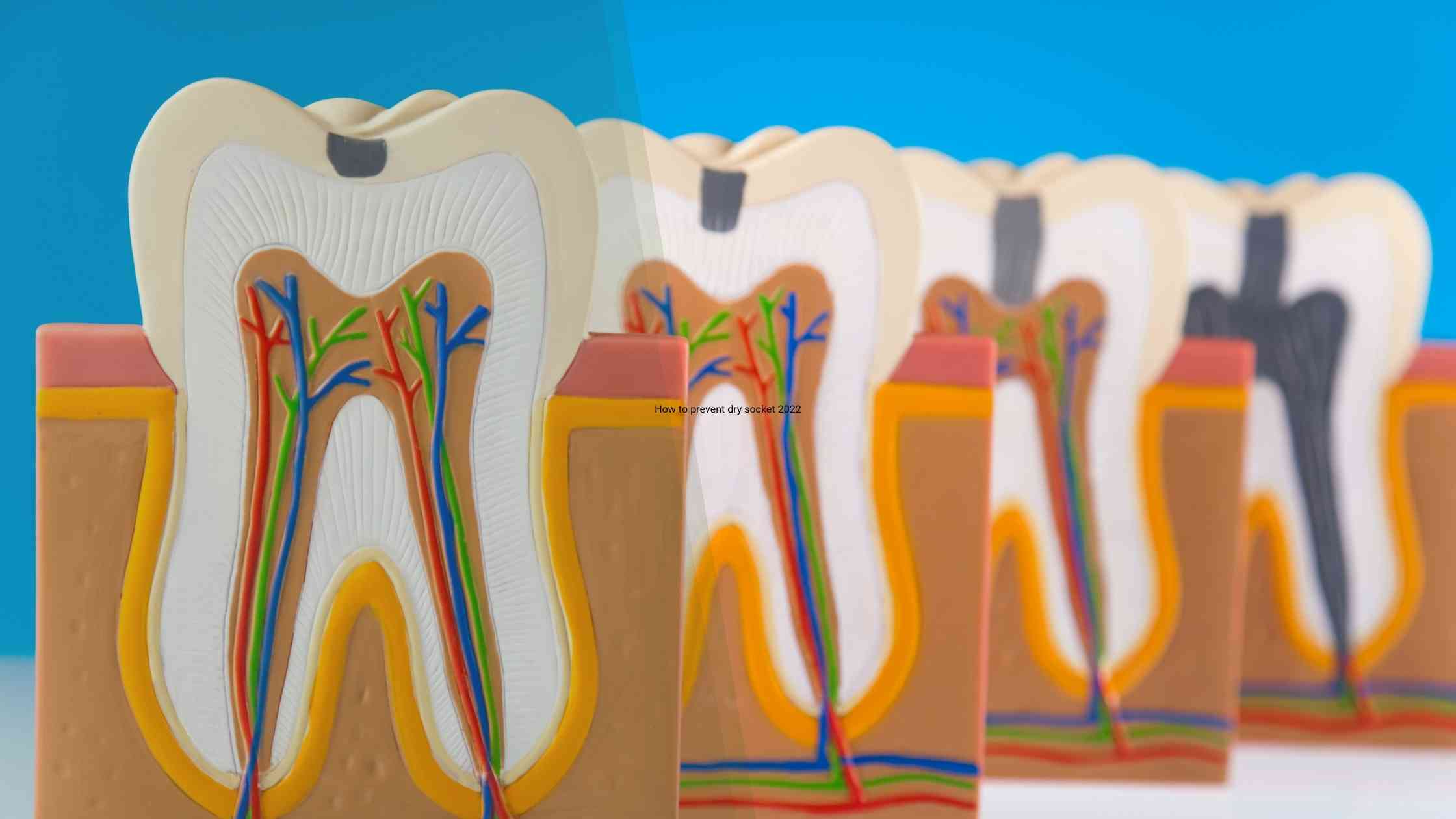
If you experience dry socket the blood clot within your mouth after a tooth has been removed will break and become dislodged. If this happens, it causes an open, or dry opening in your nerves and bone, that is known as dry socket (technically known as alveolar osteoporosis). You’ve probably been told, sockets that are dry are extremely painful and hinders healing process from happening in the same speed as it normally would.
The blood clot that develops must remain in place and should not be removed to safeguard your nerves, bone, and gums. It is not just painful when the blood clot gets dislodged it could also lead to additional problems.
These are our most effective ways to prevent dry sockets:
How to Avoid Dry Socket
There are many strategies you can employ to prevent tearing off the blood clot. Some of them may not be suitable for all people, but be aware of each one.
Avoid Straws
Straws are among the most frequent ways people get dry sockets. When you drink from straws, it’s not easy to control the speed at which the liquid is able to enter your mouth and the direction in which it will travel once it has entered your mouth. The suction that’s produced in your mouth is possibly harmful to the blood clots that guard the tooth socket.
There’s no reason to stay away from the Starbucks straws for too long. After about a week, you’ll be able return to the straw you love. As with the other tips make sure you speak with your dentist and pay attentively to their suggestions.
Avoid Smoking, Alcohol and Chewing Tabacco
Smoking cigarettes is not beneficial in terms of oral hygiene and this is true for the recovery process of the tooth extraction. Your odds of having dry socket increase by 3 times when you smoke following tooth extraction. One reason why it happens is due to the suction and inhalation that occur in the course of smoking. It’s best if you avoided all smoking while recovering (or to quit smoking altogether).
It is important to avoid alcohol since it can cause bleeding and slow down your healing. In various ways, alcohol may make your body relax too much and hinder it from healing in the manner it is supposed to.
Then, chewing tobacco, as well as all use of tobacco generally should be avoided too. Incessantly chewing, sucking or spitting may result in blood clotting and be displaced from the area of extraction.
Beware of Hard Foods That Need To be chewed
Hard foods such as chips, apples, carrots as well as some nuts, meats and more must be avoided when recovering. Anything that requires to be chewed over an a long duration is one you must be avoiding. Make sure to choose food items that are soft or that require minimum chewing you can. Here are some food items which are suitable to consume when trying to heal from tooth extraction.
- Bananas
- Soups
- Eggs
- Yogurt
- Ice Cream
- Mashed Potatoes
These are just a handful of the delicious options can be eaten! Take a look at the complete list below!
Talk to Your Dentist about the medications you are taking.
Certain medications may affect the ability of your blood to form clots. If you’re taking different medicines you’re aware of that can thin your blood or cause any issues, be sure to discuss it to your dentist.
Even if you’re certain that the medication you’re taking doesn’t thinning the blood of your patients, it’s vital that you inform your dentist aware of the medications that you’re taking.
Maintain Proper Oral Care
A proper oral hygiene routine is essential to maintaining the health of your mouth particularly one that is recovering from an procedure. To keep an optimum chance of developing dry sockets, it is recommended to clean your teeth frequently, but be careful to avoid touching the area of the extraction.
Two times per day, twice in the morning and then at night, is still the best option practice, however do not brush too close to the blood clot due to of the issues it could cause should it break off it.
To ensure that the wound is kept clean The dentist will likely supply an antibacterial mouthwash, or syringe, for you to use with care and precision to cleanse the site of the extraction.
Flossing is equally important following tooth extraction as it was prior to. Cleaning your mouth regularly can help prevent your the nerves and bones from becoming infected by the bacteria that build up due to the lack of proper taking care of your teeth. These are dental flossing guidelines to assist you in establishing proper flossing habits.
Avoid Strenuous Physical Activity
Be careful not to be too physically active is difficult. To aid in helping your mouth heal quickly and in the most effective way, you’ll need be patient for a couple of days. Tooth extraction can be extremely damaging to your body. If you’re trying to prevent dry socket, be careful not to do excessive physical activities which could trigger your blood clot to get shaken loose.
Symptoms of Dry Socket
If you suspect that you have a dry socket here are some symptoms and signs to be aware of.
In addition to a substantial pain, one of most popular methods to determine whether you have a dry socket is by looking at your mouth using the aid of a mirror. If, as you look at your mouth, you can see the visible bones in the area where your tooth was prior to it was extracted, you may have an empty socket.
Another common symptom is bad breath and a sour taste that remains within your mouth for a long time. If you begin to notice any of these symptoms, make certain to consult your dentist immediately! There are some treatments that your dentist should provide if you’ve suffered from dry socket.
Understanding dry sockets
Dry sockets can form anytime following the extraction of a tooth whether it’s teeth that are molars, as well as wisdom teeth. Following an extraction the blood clot develops within the area of the extraction to assist in the healing of your gums and protect the surrounding nerves and bone.
Dry socket is due to the fact that the blood-clot fails to develop as it should or gets dislodged. Without the protection formed by the blood clot the socket is more susceptible to the risk of food particles as well as bacteria settling in. This can result in an infection.
If you experience dry socket, the condition could be very painful. The condition is also thought of as to be a tooth emergency since it can hinder the healing process following the extraction of a tooth. Because of this, our team advises you to adhere to your post-treatment instructions with care.
Factors that make your dry socket more susceptible
There aren’t many people who suffer from dry sockets, however, it is more likely that you will develop the condition if following the recovery guidelines, or if you:
- Smoke
- Utilize birth control pills
- Use tobacco products
- Practice poor oral hygiene
- Are you suffering from dry sockets
- Preexisting gum or tooth infections.
The trauma of oral surgery can increase your risk of having dry socket. The team of Le Dentistry & Associates can determine the risk factors that can lead to dry socket and advise you on how to make extra precautions to avoid the possibility of infection and discomfort following surgery.
How can you avoid dry sockets?
It is important to know what steps you should do prior to and following the tooth extraction procedure to ensure that you heal completely and avoid any complications, such as dry socket. Our team of experts recommends:
Beware of straws
Don’t drink from straws for more than one week after the extraction due to the fact that sucking can cause blood clots to dislodge.
Take a nap
After a tooth extraction After a tooth extraction, it is essential to allow yourself to rest and stay away from strenuous activities so that your gums have the chance to heal. The force of lifting heavy or exercise can harm the area of your extraction and pull the blood clot that is in your socket.
Be aware of your diet
Make sure that you drink plenty of water , and stay clear of drinks that are acidic or hot that can break down the blood clot, and possibly cause an infection. Drinking cold or hot drinks can also cause discomfort when they touch the nerves exposed inside your gums.
Also, you must adhere to a diet that is soft for a few days following the procedure to avoid the risk of injury on your gums.
Make sure you take good care of your teeth.
After an extraction, it is essential that you wash your mouth regularly to keep your socket free of any bacteria. It is also possible to change to a soft brush in the first few days after the extraction to avoid damage to your gums.
Stop smoking
Apart from other health-related benefits that come with stopping smoking, you will recover faster from extraction surgery if your quit smoking tobacco products.
Smoking cigarettes can dislodge the blood clot inside your socket. Smoke products can also be a source of chemical which can affect the flow of blood through your gums, which can slow down your recovery process as well as increasing the chance of infections.
Every year, due to a variety of reasons millions of Americans decide to undergo one or more dental procedures extracted. According to American Public Health Association, 10 million wisdom teeth are extracted within the United States each year. The following days after the tooth removal are vital to speed up the healing process. If you don’t take certain precautions followed, you may end having a painful and uncomfortable condition or dry socket! If you’ve were forced to extract a tooth because of decay or wisdom teeth that are impacted, take these steps to prevent pain.
WHAT IS DRY SOCKET?
Dry socket, commonly referred to as alveolar osteosteitis, is an extremely painful condition that can develop following the extraction of a tooth in which our body’s normal healing procedure fails or is disrupted.
Typically there is a blood clot that forms over the socket of the tooth the area that previously was the place where the tooth was buried – after the tooth is removed. The blood clot shields the bones underneath and nerves, and permits for healing to occur.
Sometimes, however, the clot may dissolve or dislodge and leave the area in which the tooth was taken exposed. Dry sockets are a painful condition which is not always resolved without treatment from dental professionals.
Dry socket symptoms include:
- The pain is severe just a few days after tooth extraction
- Bad breath that persists
- The taste of your mouth is not pleasant.
- The socket is empty, or there is visible bone within the socket
5 TIPS TO AVOID DRY SOCKET
Although dry socket is not entirely preventable, here’s a guideline to follow to lessen the chance of it occurring to you:
- #1 Beware of tobacco useSmoking and using tobacco could increase the risk of developing dry sockets following tooth extraction. Smoking anything whatsoever after getting a tooth extracted – like vaping, for instance it is dangerous, since the rapid inhalation of smoke could cause the dislodgment of a blood clot that has formed in your mouth.
- #2: Don’t drink through strawsIf you like using straws for drinking it is recommended to avoid drinking for at least one week following the extraction of your tooth. The suction action of your mouth could remove the blood clot.
- #3: Stay clear of certain foodsStay away from food items which could become stuck in your socket, like chips, seeds, nuts and candies that stick to your socket. Instead, you should choose soft food items right following your surgery, such as apple sauce, yogurt or potatoes that have been mashed.
- #4: Provide your medical information and medical information Certain medications can thin the blood and stop a blood clot from becoming. To prevent this, make certain to discuss the medicines you’re currently using to your dental professional.
- #5: Maintain good oral hygieneKeeping Your mouth clean will keep infection and germs from attacking and destroying the blood clot. Consult your dentist for advice regarding how to clean your teeth after having an extraction procedure.
If you are experiencing any issues with the blood clot in your body does not dislodge or disintegrate, don’t delay in contacting the dentist in McKinney immediately. A professional treatment can ensure that any issues that arise following an extraction are dealt with before they cause serious discomfort.





